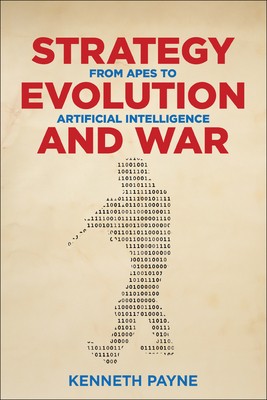
- We will send in 10–14 business days.
- Author: Kenneth Payne
- Publisher: Georgetown University Press
- Year: 2018
- ISBN-10: 1626165807
- ISBN-13: 9781626165809
- Format: 15.2 x 22.9 x 1.6 cm, minkšti viršeliai
- Language: English
- SAVE -10% with code: EXTRA
Reviews
Description
Decisions about war have always been made by humans, but now intelligent machines are on the cusp of changing things - with dramatic consequences for international affairs. This book explores the evolutionary origins of human strategy, and makes a provocative argument that Artificial Intelligence will radically transform the nature of war by changing the psychological basis of decision-making about violence.
Strategy, Evolution, and War is a cautionary preview of how Artificial Intelligence (AI) will revolutionize strategy more than any development in the last three thousand years of military history. Kenneth Payne describes strategy as an evolved package of conscious and unconscious behaviors with roots in our primate ancestry. Our minds were shaped by the need to think about warfare--a constant threat for early humans. As a result, we developed a sophisticated and strategic intelligence.
The implications of AI are profound because they depart radically from the biological basis of human intelligence. Rather than being just another tool of war, AI will dramatically speed up decision making and use very different cognitive processes, including when deciding to launch an attack, or escalate violence. AI will change the essence of strategy, the organization of armed forces, and the international order.
This book is a fascinating examination of the psychology of strategy-making from prehistoric times, through the ancient world, and into the modern age.
EXTRA 10 % discount with code: EXTRA
The promotion ends in 21d.19:10:55
The discount code is valid when purchasing from 10 €. Discounts do not stack.
- Author: Kenneth Payne
- Publisher: Georgetown University Press
- Year: 2018
- ISBN-10: 1626165807
- ISBN-13: 9781626165809
- Format: 15.2 x 22.9 x 1.6 cm, minkšti viršeliai
- Language: English English
Decisions about war have always been made by humans, but now intelligent machines are on the cusp of changing things - with dramatic consequences for international affairs. This book explores the evolutionary origins of human strategy, and makes a provocative argument that Artificial Intelligence will radically transform the nature of war by changing the psychological basis of decision-making about violence.
Strategy, Evolution, and War is a cautionary preview of how Artificial Intelligence (AI) will revolutionize strategy more than any development in the last three thousand years of military history. Kenneth Payne describes strategy as an evolved package of conscious and unconscious behaviors with roots in our primate ancestry. Our minds were shaped by the need to think about warfare--a constant threat for early humans. As a result, we developed a sophisticated and strategic intelligence.
The implications of AI are profound because they depart radically from the biological basis of human intelligence. Rather than being just another tool of war, AI will dramatically speed up decision making and use very different cognitive processes, including when deciding to launch an attack, or escalate violence. AI will change the essence of strategy, the organization of armed forces, and the international order.
This book is a fascinating examination of the psychology of strategy-making from prehistoric times, through the ancient world, and into the modern age.


Reviews